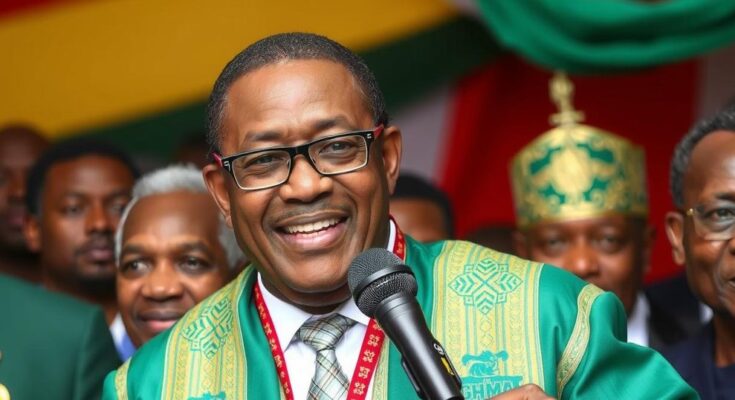John Dramani Mahama, Ghana’s former president, has been declared the winner of the presidential election with 56.5% of the votes, succeeding amid widespread discontent regarding the economy. His main opponent, Vice President Mahamudu Bawumia, conceded defeat as celebrations erupted among Mahama’s supporters. The election was marked by significant economic challenges and a demand for change within the governance style.
On Monday evening, Ghana’s former president, John Dramani Mahama, was officially declared the victor of the recent presidential election. Mahama, who served from 2012 to 2017, garnered 6.3 million votes, translating to 56.5% of the total ballots cast, as reported by the electoral commission. His primary rival, Vice President Mahamudu Bawumia, conceded defeat after receiving 4.6 million votes, or 41% of the total. Mahama characterized his win as “emphatic,” promising a comprehensive “reset” of the nation amid widespread dissatisfaction with the government’s economic stewardship during a time of significant financial crisis.
Celebrations erupted among Mahama’s supporters following his victory announcement, particularly in the capital, Accra, where crowds donned the colors of his opposition party. The election, which also included parliamentary positions, occurred against the backdrop of Ghana’s most severe cost-of-living crisis in a generation. Advocates deemed it a crucial test of democratic principles in a region impacted by violence and political instability.
Mahama’s opposition party, the National Democratic Congress, also secured a majority in parliament, reflecting a broader trend wherein voters are favoring opposition parties globally amidst feelings of discontent towards incumbences. Political analysts emphasized that the electorate’s dissatisfaction stemmed chiefly from economic hardships, as articulated by Seidu Alidu from the University of Legon, who noted that even in challenging times, transparent governance is paramount.
This electoral outcome in Ghana aligns with a global pattern wherein citizens are increasingly making their grievances known through the ballot box, indicative of a desire for accountability and change in governance.
The recent presidential election in Ghana is pivotal as it showcases the public’s response to economic hardship and governance issues. Ghana, known for its relative stability in West Africa, faced a significant cost-of-living crisis that influenced voter sentiment. The election results reflect a broader global trend of opposition parties gaining traction as citizens express dissatisfaction with incumbent governments, emphasizing the importance of economic management and effective governance.
In conclusion, John Dramani Mahama’s victory signifies a shift in Ghanaian politics shaped by economic concerns and a desire for change. The electorate demonstrated its preference for a leader who promises to address pressing issues and restore faith in governance. This election not only reflects the mood of Ghanaian society but also underscores a larger, regional narrative of political transition in West Africa.
Original Source: www.usnews.com




